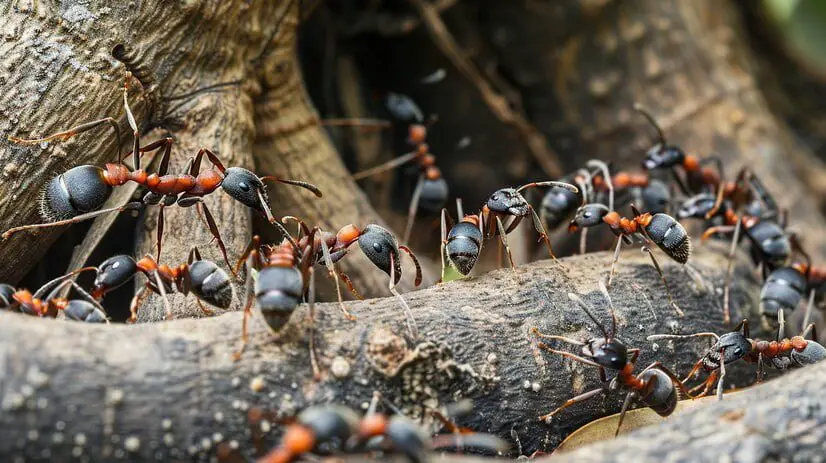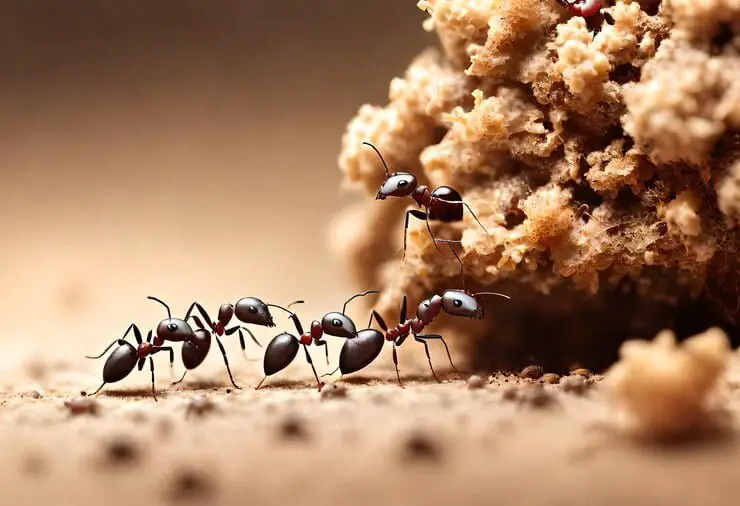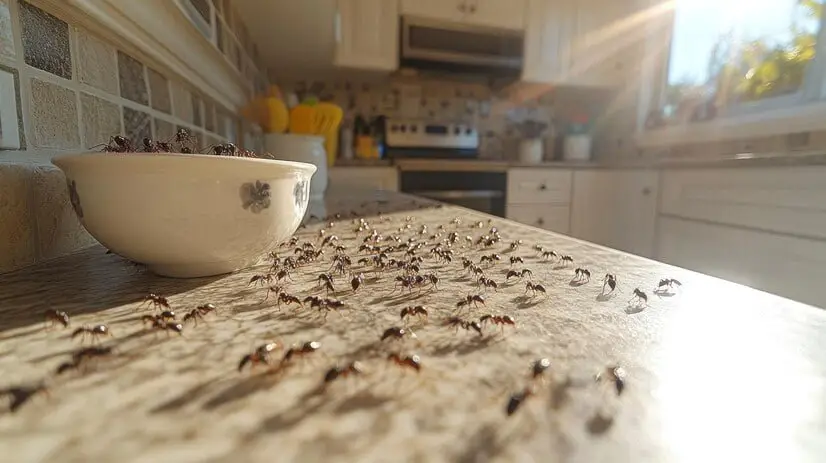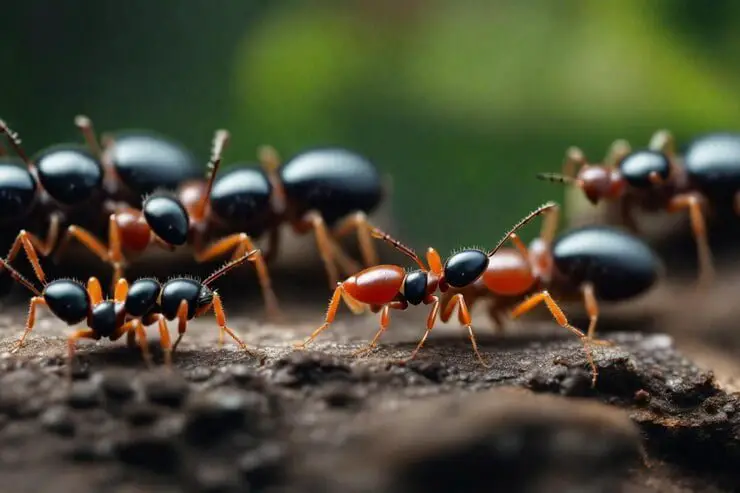Table of Contents
Get rid of ants
Ants seem to have a knack for appearing just when you least expect it. You might see them marching single file across your kitchen counter, raiding your picnic, or sneaking around the garden. While they play important roles in nature—like aerating the soil and controlling pests—when they invade our homes, they can become an unwanted nuisance. So, let’s consider how to deal with these little intruders and reclaim your space!

Understanding Ant Behavior
Before we jump into ways to get rid of ants, it’s useful to understand a little about their behavior. Ants are social insects, meaning they live in colonies that can range from just a few members to millions! They communicate through pheromones, which are chemical signals that help them find food, warn other ants of danger, and guide them back to the nest.
What will Ants keep away/Smell do Ants hate the most
Ants dislike strong, pungent smells. Citrus scents such as lemons or oranges are particularly effective in removing them. They also avoid the smell of vinegar and peppermint.
Basically, anything with a strong, strong smell can disrupt their scent pathway and make the area less inviting. So if you’re looking to keep ants away, you’ll want to use these scents around your home.
When you see a line of ants, they are actually following a trail of pheromones. The more food they find, the stronger the trail becomes, making it easier for more ants to join. That’s why it’s so important to deal with them quickly – if you don’t, you could end up being a full-fledged invader!
1: Identify the ant species.

Not all ants are the same, and different species may require different methods. Common types include:
- Carpenter ants: These ants love to nest in wood and can cause structural damage.
- Fire ants: Known for their painful sting, they can also be aggressive.
- Stinky house ants: When crushed, these ants emit an smell similar to that of rotten coconuts.
- Sugar ants: They are attracted to sweet foods and can easily invade kitchens.
Identifying the type of ant can help you choose the most effective way to get rid of them.
2: Identify the source of Ants.

Once you know what type of ants you’re dealing with, it’s time to track their trail. Find out where they are coming from and where they are going. Often, they will take you back to a food source, nest, or entry point.
- Follow the Trail: Observe the ants throughout the day to see if they lead you back to a specific location.
- Check for nests: This can be in the yard or inside your home, often in dark, damp places (such as behind appliances or in walls).
3: Clean.
A clean environment is your best defense against ants. They are always looking for food, so keeping your home spotless can go a long way. Here are some helpful tips:
- Clean surfaces: Use disinfectant to clean counters, tables, and any surface where food is prepared or eaten. Don’t forget to check out the tools below!
- Store food properly: Keep all food in sealed containers. Ants can easily chew through packaging, so it’s best to use glass or hard plastic rather than cardboard.
- Don’t leave pet food out: If you have pets, avoid leaving their food bowls out for long periods of time. Consider feeding them at specific times and cleaning up later.
4: Seal the entry points.
Once you’re done cleaning, it’s time to block their entry into your home. Here is the method:
- Inspect your home: Look for cracks in walls, gaps around windows and doors, and openings around plumbing.
- Use Caulk: Seal any gaps you find with caulk or another suitable material to keep ants and other pests out.
- Install Weather Stripping: Adding weather stripping to doors and windows can help create a barrier.
5: Natural Remedies to get rid of Ants
If you want to avoid chemicals, there are some natural remedies you can try:
- Vinegar Solution: Mix equal parts vinegar and water in a spray bottle. Sprinkle it around entrances and on trails. Strong scents will disrupt their pheromone trails and help repel them.
- Boric Acid and Sugar: Mix sugar, water and a small amount of boric acid to make a bait. Sugar attracts ants, and boric acid will help repel them. Just make sure to keep it out of the reach of pets and children.
- Coffee grounds: Some people swear by using coffee grounds. Sprinkle them near ant trails or entry points—many ants dislike the smell of coffee, and it can act as a natural repellent.
- Essential oils: Some essential oils, such as peppermint, tea tree, and lemon oils, can repel ants. Mix a few drops with water in a spray bottle and apply it to the areas where you have seen ants.
6: Commercial ant baits and sprays
If natural remedies aren’t cutting it, you can consider commercial options. There are many effective ant baits and sprays available:
- Ant baits: These usually contain a slow-acting insecticide that the ants carry back to their colony. Look for products that are specifically formulated for the type of ants you are dealing with. Be sure to follow the instructions carefully.
- Insect spray: For quick action, an insect spray can be used directly on visible ants. However, this is usually a short-term solution and will not affect the colony.
7: Monitor the situation.
After implementing your chosen solution, monitor the situation.
- Check for activity: Check to see if ants are still coming in or if you’re seeing less of them.
- Reapply the solution: You may need to reapply the toilet or spray to maintain their effectiveness.
8: Call the experts to Get rid of ants.
If you find that your efforts aren’t working and the ant infestation is persistent, it may be time to call in a pest control professional. They have access to robust products and information about ant behaviour that can effectively eliminate the problem.
Prevention tips
Once you’ve dealt with the ants, you’ll want to make sure they don’t come back. Here are some effective safety measures:
- Routine cleaning: Continue regular cleaning practices to minimize food sources.
- Exterior care: Cut back any bushes or trees near your home, as they can act as a bridge for ants.
- Monitor for new entries: Continue to check for new entry points or signs of pest activity.
Conclusion
Dealing with ants can feel overwhelming, but with a combination of cleaning, proper sealing, natural remedies, and, if necessary, commercial products, you can send those pesky invaders packing! Remember, the key is persistence. Be vigilant and proactive, and your home can be ant-free once again. Good luck, and don’t hesitate to get in touch if you have any more questions about pest control or need more help!


Thanks for sharing. I read many of your blog posts, cool, your blog is very good.
Your article helped me a lot, is there any more related content? Thanks!
I don’t think the title of your article matches the content lol. Just kidding, mainly because I had some doubts after reading the article.